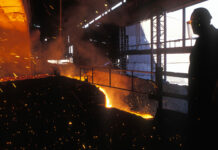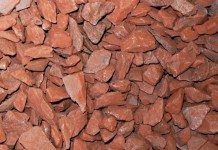
[miningmx.com] — KUMBA Iron Ore moved first in the looming arbitration battle with its biggest South African client ArcelorMittal South Africa, firing off a statement of claim against the steel maker on Monday in the opening salvo of what could be a long process.
Matters came to a head between Kumba, in which Anglo American holds 63%, and ArcelorMittal after the steel maker’s 21.4% rights in the Sishen iron ore mine lapsed at the end of April 2009 and reverted back to the state. Kumba immediately applied for the mining rights over the stake and took the opportunity to end a cost plus three percent supply arrangement on 6.25 million tonnes of iron ore to ArcelorMittal annually.
From the start of March this year Kumba has changed the supply terms to prices on a commercial basis. It is still charging ArcelorMittal cost plus three percent but wants the difference between that price and the commercial price to be paid into an escrow account until matters have been decided by a three-member arbitration panel.
Kumba says its subsidiary, Sishen Iron Ore Company, in which mining empowerment group Exxaro Resources has a 20% stake, had sent ArcelorMittal an invoice for March, asking for the difference in prices be placed into the escrow account.
ArcelorMittal confirmed it has received the statement of claim and is considering the formation of an escrow account but that no decision has been made.
Whoever wins the arbitration will be awarded the funds in the escrow account. ArcelorMittal has already begun making provision for this by charging its customers an extra R600 or $80 per tonne of steel. It says it will pay this money back to clients if it wins the arbitration hearing.
Analysts point out this will be an immensely complicated exercise for ArcelorMittal, compounded by the time the arbitration is expected to take. They also suggest senior managerial heads within ArcelorMittal South Africa should roll over the loss of one of its most important assets, the access to some of the cheapest iron ore anywhere.
ArcelorMittal has raised the prospect of shutting down its export-focused Saldanha steel mill because of the increased cost of iron ore, bringing with it thousands of job losses.
ArcelorMittal’s decision to bump up prices to cover the cost of more expensive iron ore drew the immediate wrath of the government, which reported the steel maker to the country’s competition authorities.
The first to make a move in launching the arbitration process was Kumba, which has served the statement of claim on ArcelorMittal on Monday morning. This is basically a document outlining what its case will be and the ruling it is seeking. ArcelorMittal will now send back a statement of reply, outlining its arguments and what rulings it is seeking as well as any possible counter claims.
If the arbitration process over ArcelorMittal’s access to the Sishen South project is anything to go by, shareholders and customers are in for a long wait. ArcelorMittal wanted preferential access to Kumba’s new expansion project, but a three-year arbitration process ruled that it has no rights to ore from the project.
The two sides will next prepare discovery documents, which lay out their arguments and these are submitted to the arbitration panel. Each party selects one member of the panel and the third is a mutually acceptable appointment. The members are usually drawn from the legal arena and have experience as judges.
The twist in this story comes in the Department of Mineral Resources’ decision to award a prospecting right over the 21.4% stake that was held by ArcelorMittal to an unknown company called Imperial Crown Trading 289 (ICT), which counts as its directors politically connected individuals.
IN the past two weeks a relationship has developed between ICT, the company that obtained those mineral rights in controversial circumstances, and President Jacob Zuma’s flamboyant son, Duduzane Zuma, reports Miningmx’s sister site Sake24.com.
Duduzane Zuma (27) is, together with Jagdish Parekh, a director and shareholder at JIC Mining Services, a contractor mining company that mainly provides labour-broking services to mines. During the past two weeks Parekh has become a director of ICT and, according to him, owns 50% of this company.
Parekh is CEO and a shareholder in JIC. Zuma Jnr also owns shares in JIC, and therefore in ICT, which applied for the 21.4% on the same day that Kumba did. Mining laws stipulate that preference must be given by the DMR in such cases to “historically disadvantage South Africans’.
Kumba has appealed the decision and the DMR said it is reviewing the process.











